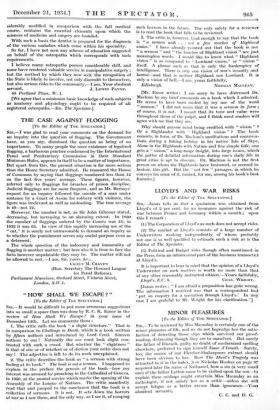" HOW SHALL WE ESCAPE ? "
(To the Editor of THE SPECTATOR.] SIR,—It would be difficult to put more erroneous suggestions into so small a space than was done by R. C. K. Ensor in the review of How Shall We Escape ? in your issue of December 14th. Let me enumerate them : 1. The critic calls the book " a slight structure." That is in comparison to Challenge to Death, which is a book written by fifteen authors and introduced by Lord Cecil. Sixteen authors to one ! Naturally the one must look slight con- trasted with such a crowd. But whether the " slightness " is that of size or of intellect or of diction your critic does not say ! The adjective is left to do its work unexplained.
2. The critic describes the book as " a sermon with strong feeling at its back." The book is not a sermon. I happened to explain in the preface the genesis of the book—how my interest was aroused by preaching in the Cathedral of Geneva, in 1930, at the annual service which marks the opening of the Assembly of the League of Nations. The critic manifestly read that and jumped to the conclusion that the book is a collection of sermons. It is not. It sets down the horrors of war as I saw them, and the only way, as I see it, of escaping such horrors in the future. The only safety for a reviewer is to read the book that falls to be reviewed.
8. The critic is, however, kind enough to say that the book is " a sermon with . . not a few touches of Highland vision." I have already pointed out that the book is not " a sermon " and " the touches of Highland vision " are just meaningless words. I would like to know what " Highland vision " is as compared to " Lowland vision," or " vision " itself. A phrase such as that is only the bankruptcy of intelligence. There is only one vision of war's insanity and horror—and that is neither Highland nor Lowland. It is only a vision of hell.—I am, yours faithfully, [Mr. Ensor writes : I am sorry to have distressed Dr. Maclean by my brief comments on a book which I admired. He seems to have been misled by my use of the word " sermon." I did not mean that it was a sermon in form ; of course, it is not. I meant that its tone and value were throughout those of the pulpit, and I think most readers will agree with me that they are.
Why should anyone mind being credited. with " vision " ? Or a Highlander with " Highland vision " ? The book consists, in form, of Dr. Maclean's meditations and conversa- tions during a fishing holiday in his native Isle of Skye. Alone in the Highlands with Nature and fine simple folk, one gets a " vision," a long-range insight, into large issues, which the patter of detailed information during one's daily life in great cities is apt to obscure. Dr. Maclean is not the first person on whom the Highlands have bestowed, or seemed to bestow, this gift. But the " not few " passages, in which he conveys his sense of it, ranked, for me, among his book's best features.]


































 Previous page
Previous page